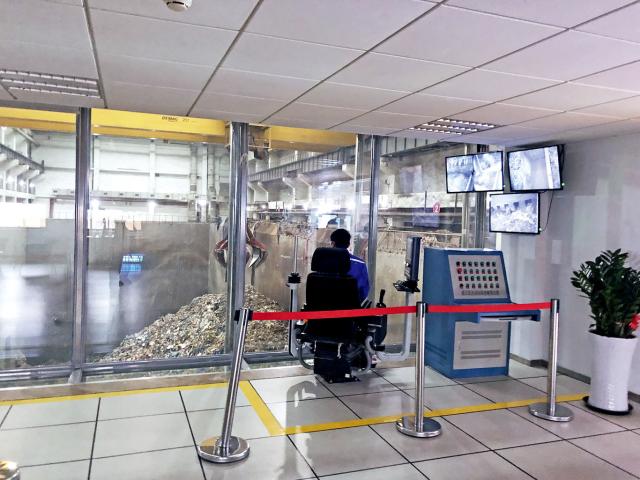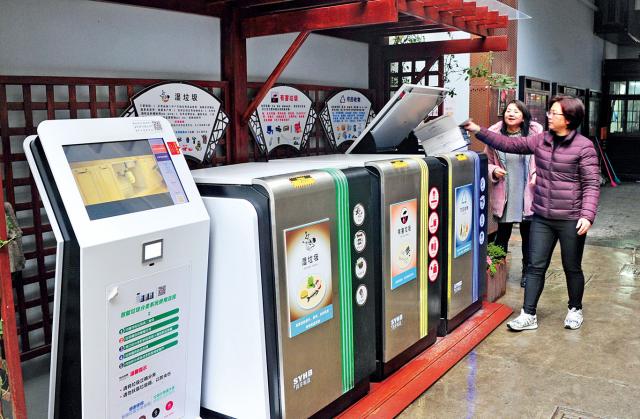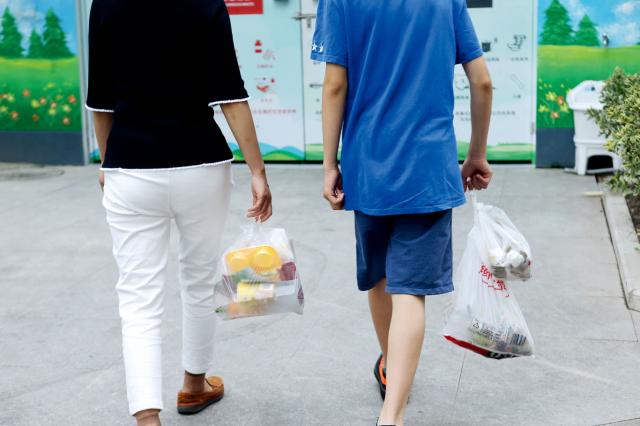NewsChina delves into the nation’s garbage pile and asks if the renewed efforts to mobilize an entire city’s population will help citizens clean up their act
Every afternoon at 4 pm, a cleaner surnamed Wang, who works at Huangpu Xinyuan residential complex in Shanghai arrives promptly at the community’s brand new garbage sorting station. He checks to ensure that no one has put the wrong type of trash into the wrong bin. Noticing a packaging box was wrongly put in the dry waste bin, he swiftly took it out and threw it inside the nearby one for recyclable material.
Since mid-June, he’s been going to the trash station four times a day. At peak garbage disposal times in the morning and evening, he spends around two hours helping residents decide which category their trash belongs to – recyclable materials, hazardous waste, “wet” or kitchen waste, and “dry” waste. Then at noon and 4 pm, he comes again to check and sift through the garbage before it is sent away for further processing.
It’s never been so cool to talk trash, and dealing with trash has never been so smart. Since Shanghai announced new compulsory measures to deal with household waste, which were rolled out from July 1, everyone has been talking about the new requirements to sort their garbage – or face fines for not doing so.
There are apps to help people decide what category their waste falls into. Some have quizzes so people can test themselves. Children are being taught about waste in kindergarten. Media reports claim that people are hiring themselves out as professional garbage sorters to help the busy, confused or lazy, and everyone across the nation is keeping a keen eye on Shanghai, just the vanguard of China’s new waste policy, which is expected to sweep across the country in the near future.
An army of volunteers is on hand in every community, so that during the designated hours for taking out the trash, no one miscategorizes their waste. The trash station has smart bins, which can be opened by swiping a card. Each household is issued different types of garbage bags for the different types of waste.
Once the bag is filled and is taken to the station, by scanning the QR code on each bag, the designated bin can be automatically opened. According to the regulation, resistance to or continued failure to classify garbage in the correct way by individuals can result in fines of up to 200 yuan (US$30), and for companies, organizations or restaurants who violate the rule, the fine can go up to 50,000 yuan (US$7,266).
Gone to Waste
Attempts to promote garbage sorting started two decades ago in Shanghai. In 2000, eight cities including Shanghai, Beijing, Nanjing, Guangzhou and Shenzhen were designated to pioneer garbage sorting systems. But as can be seen in most communities in these cities, the attempt fell by the wayside. Most residents are aware that even if they separate their garbage, the collectors just mix it altogether again.
But after Shanghai held the World Expo in 2010, which emphasized green development, pressure started building for renewed efforts.
According to Shanghai Landscaping and City Appearance Administrative Bureau chief Deng Jianping, who made a public speech in April, some 25,000 tons of garbage are generated in the city every day by its over 24 million city population. “Without proper treatment, this garbage can pile up and create a skyscraper as high as the Jinmao Tower [one of the tallest buildings in the city] in Shanghai,” Deng said.
The lack of recycling has been blamed by industry insiders and environmental activists as the main cause for the expanding landfills surrounding cities in China. Many urban areas face problems such as shortage of landfill sites, air pollution from incinerators, and soil contamination from heavy metals from dumped hazardous waste, like chemicals or batteries. On the other hand, proper sorting and classifying garbage can facilitate better recyclable resources, while at the same time improving the efficiency of incinerators by removing unsuitable materials. The two key steps as a solution for garbage treatment are first, waste reduction and second, garbage classification. In 2014, Shanghai released a government document on promoting household garbage classification and reduction, which is when it decided to sort garbage into its four chosen categories. But still nothing happened until the recent campaign. None of the other seven pilot cities managed to clean up their waste and recycling problems either, as the grand societal push that is required never happened.
“We can say that garbage sorting is a revolution toward both the production industry and people’s lifestyle,” said Professor Du Huanzheng, director of the Research Institute of the Recycled Economy at Tongji University in Shanghai. Du believes the biggest difficulty is breaking down traditional habits, which will take time.
The biggest discouraging factor was lack of proper separation and treatment of waste, even if it had been sorted for recycling. The new regulation clearly forbids any form of mixing of already sorted trash by garbage trucks, and provides an online platform for residents to report infractions if they see them.
Du told NewsChina that Shanghai has beefed up efforts to build garbage processing facilities in recent years, aiming at fulfilling the whole cycle of garbage classification, separate transportation and separate processing.
“This is the prerequisite for continued garbage classification attempts, but of course the full capacity for classified garbage treatment in Shanghai is yet to be attained. At least so far, the city is adequately prepared,” he said. According to official statistics, by the end of 2020, Shanghai’s household garbage treatment capacity will exceed 32,800 tons a day. Among this, 7,000 tons of wet or kitchen garbage will be recycled for other uses.
The top-down scheme designed holistically to involve the government, enterprises, individuals and non-government organizations is vitally important to achieve a sustainable system. In Du’s opinion, the new concept of having a joint system with the government as the dominating force and enterprises as the key operation force will decide whether the mechanism can be maintained.
However, according to Mao Da, a scholar in environmental history and an advocate for environmental NGO Zero Waste Alliance, Shanghai still needs to step up its construction of facilities for kitchen waste processing. “As far as I know, there still isn’t enough capacity to process waste, despite the present effective social mobilization in Shanghai. Particularly when the initial household garbage classification is implemented thoroughly and effectively, the huge amount of kitchen waste will put pressure on the limited end processing capacity,” Mao said. “Hopefully, the precondition of garbage classification once achieved, can force the city government to speed up construction of end-stage facilities, so they can close the remaining gap soon.”
Recycled Legislation
In 2017, the State Council released a rule on the Implementation of the Household Garbage Classification System. It clearly stipulated that 46 cities, including Shanghai, are obliged to have implemented compulsory garbage sorting of household waste by 2020. Soon after, authorities in Shanghai started researching the legislation procedure for garbage classification. In the following two years, intensive studies and field work were conducted in different communities, organizations and enterprises. According to Du Huanzheng, who helped in the research and consulted for the Shanghai government, the main issue lies in whether household garbage should be sorted, and whether it needed legislation to enforce it.
“On the one hand, legislation is necessary, as without it, this new attempt would fall victim to the same previous failures. On the other hand, legislation will not be effective unless over 60 to 70 percent of the population agrees and is willing to actually sort their garbage. This needs education and effective community promotion,” Du said. “With the support of the majority, the regulation will come into play by punishing the other 20 or 30 percent of the population who refuse to do it.” Many experts in the field acknowledge that it could take as long as a whole generation to fully change people’s habits.
The State Council implementation guideline for dealing with waste does not require a one-size-fits-all solution for each individual city. Instead it encourages localized regulations. “We think Shanghai can play a leading role in this process,” Du said.
“The legislation procedure in Shanghai relates the issue immediately to everyone, which stimulates the mainstreaming of household garbage classification. Whether there are existing criticisms, doubts, and uncertainties toward the ongoing implementation of the regulation, the change is so far very positive. The topic itself, one which used to be marginalized, has become mainstream,” Mao told NewsChina. “I believe with top-down design and guidance, a social revolution on garbage classification is on the way,” he added.
According to the new regulation, a responsible person system is adopted. Furthermore, the new regulation also requires curbing usage of overpackaging and reducing the amount of unrecyclable garbage.

A worker piles up dry waste before it is incinerated at a waste disposal site in Shanghai

Residents use a smart waste sorting system in Huangpu District in Shanghai, February 20, 2019

Residents in a residential community in Shanghai’s Minhang District dispose of household garbage, June 19, 2019
To Sort or Not to Sort?
In late June, when the reporter visited the Shanghai Landscaping and City Appearance Administrative Bureau, the official organization mainly responsible for garbage sorting, the building was mostly empty since according to one staff member, “most colleagues and bureau officials are out on the streets to promote and inspect the implementation of the garbage sorting policy.”
There are 18 detailed measures to help facilitate the process, which include a social mobilization system for garbage classification, management and disposal of large pieces of garbage and green packaging standards for the express delivery industry.
On the streets of Shanghai, there are trash cans tagged with dry garbage and recyclables, placed approximately two to three hundred meters apart. Collection of wet or kitchen waste is mainly inside residential communities or at supermarkets, restaurants and shopping malls. This mandatory garbage sorting system requires residents to throw away garbage at a fixed time and place. On average, the daily time for garbage disposal is three to four hours. According to the regulation, one disposal site is designated for every 300 to 500 households, with volunteers on hand to help out. Along with this, the number of waste bins inside communities has been reduced. According to official statistics, by late May, over 10,000 garbage disposal sites have been renovated or upgraded in 13,000 residential complexes, and it is estimated that a total of over 17,000 garbage disposal sites will be renovated by the end of this year.
By early July, Shanghai designated 982 vehicles for collecting wet garbage, 3,155 vehicles for dry garbage and 49 for hazardous waste. The daily wet garbage treatment capacity is 4,300 tons, and dry garbage treatment capacity is 13,300 tons. According to Deng Jianping, there are eight more wet garbage treatment centers planned or already under construction, as well as eight planned dry garbage incineration plants in Shanghai. “By 2020, the treatment capacity for wet and dry garbage is expected to increase to 7,000 tons and 20,800 tons per day respectively. This is to help fulfill our goal of ‘zero landfill’ by then,” Deng said. Despite the wall-to-wall publicity, not everyone in the city is aware of the new rules. Accompanying cleaner Wang to the disposal site in Huangpu Xinyuan residential compound, a woman tried to throw out a bag with paper and banana peel mixed together. Wang walked up to her. “Have you sorted your garbage?”
“What do you mean?” The woman was surprised. Wang explained the regulation to be implemented within days and helped her sift her garbage into different categories. It’s common that residents choose the wrong bins to dump their garbage.
“What can I do? I don’t have legal enforcement powers so I can only try to persuade them to pay attention next time,” Wang sighed. But failure to sort garbage may soon result in a black mark on one’s social credit score, which in Wang’s opinion could be helpful. But for now, no one knows how to ensure people actually sort their trash properly.
Others are already more positive. Wang Shengli, who lives in Xuhui District in Shanghai, told NewsChina in mid-July that the new rule has completely changed the habits and attitudes of locals toward garbage. “Before, we just threw our garbage in a public trash can on each floor in our apartment building, but now residents in my community are required to take their separated garbage all the way downstairs to a fixed collection point, so in the beginning people were not very proactive, and I did see some littering intentionally left in the flower bed downstairs,” Wang said. “But with the explanation and guidance of volunteers, I feel people started to get used to this gradually, and as we learned how important it is, we support the measure.”
Wang Shengli said that at first, he did struggle a lot to separate, for example paper tissue from watermelon seeds and crab shells.
“We used to wrap the food remains in tissue, but now since tissue is dry waste, but watermelon seeds or crab shells are wet waste, we have to separate them. But I feel it’s all about habit, and it isn’t too difficult to change,” he said.
The Transportation Issue
Since the regulation took effect, NewsChina learned from an inside source that Shanghai Urban Management and Law Enforcement Bureau is to step up its monitoring of the city’s 230 garbage transportation enterprises. From August, their main work will be enforcing separate garbage treatment in 20 household garbage treatment centers at the end process.
“Individuals won’t be the main target for legal enforcement and punishment in the beginning, but one may be fined if they resist complying with the new rule,” said Xu Zhihu, director of the Shanghai Urban Management and Law Enforcement Bureau. For the moment, monitoring and enforcement will focus more on organizations and companies.
In the first week after the new rules started, Shanghai Urban Management and Law Enforcement Bureau fined four garbage transportation companies for violations and gave more than 100 tickets to shopping malls which did not install the right type of trash cans.
According to the central government’s plan, Shanghai is the first to try the new rules, and other cities will be able to share its experience. Along with Shanghai, other cities including Beijing, Guangzhou and Shenzhen have all put legislation for mandatory garbage classification into their official agenda. Du Huanzheng said that due to different industrial structures, consumption structures and varieties of waste in different cities, the policies should be tailored for local circumstances. “Garbage classification is a long-term strategy, and to promote it nationwide requires a certain amount of time. It can’t be done and succeed in a hurry,” Du said.

 Old Version
Old Version


